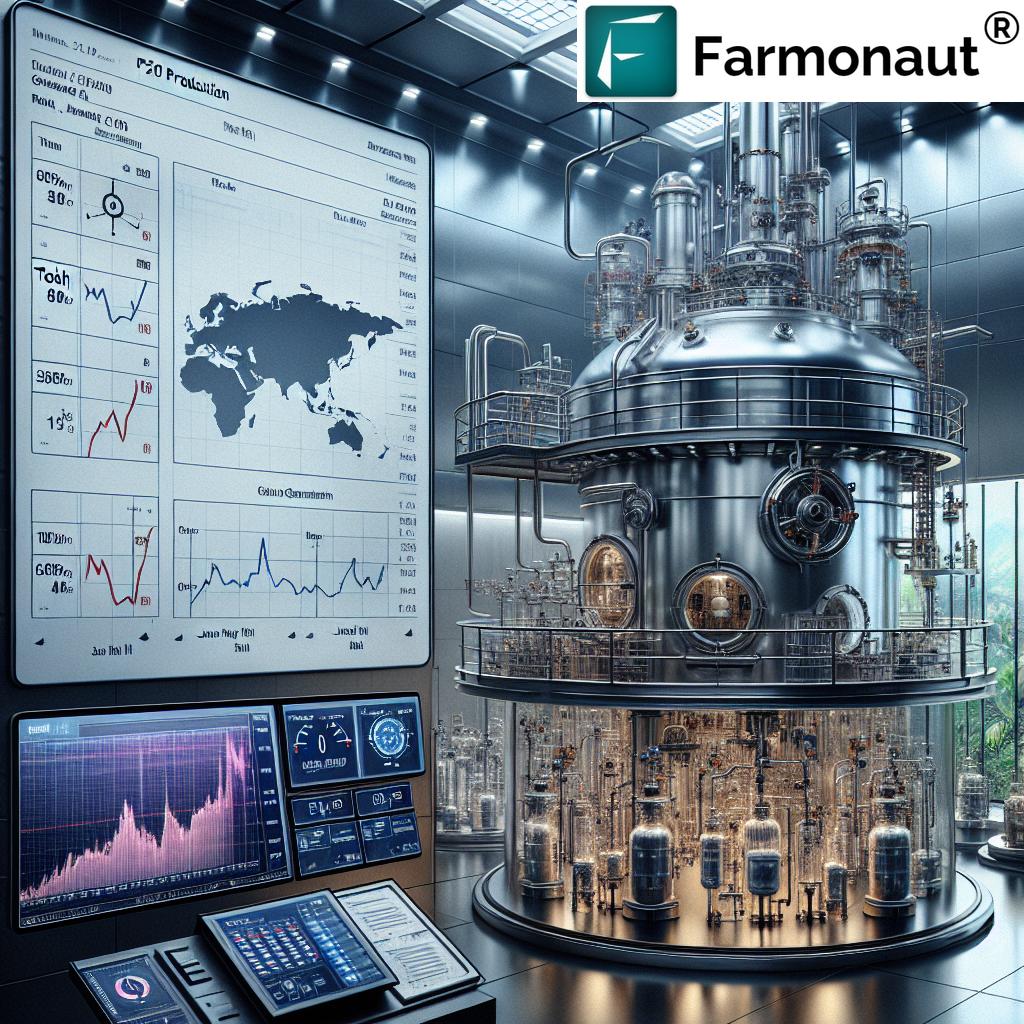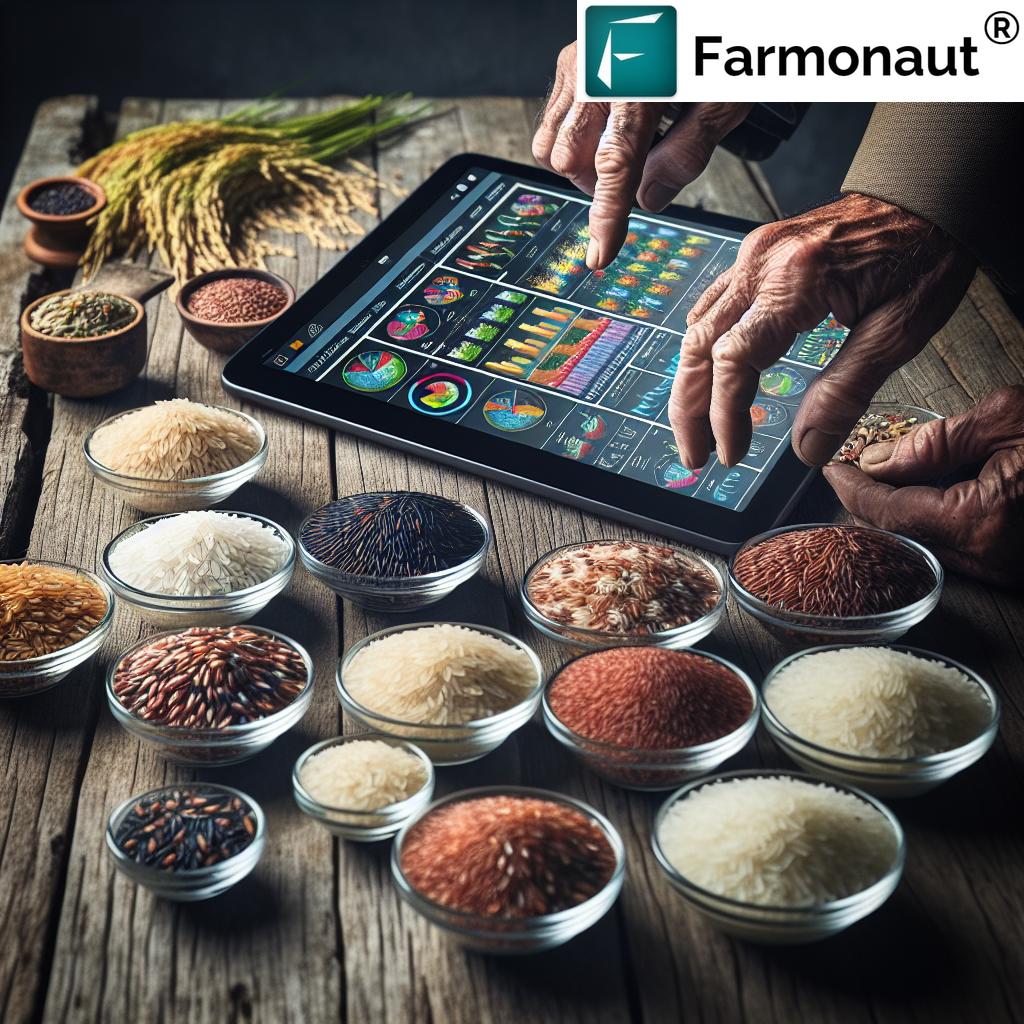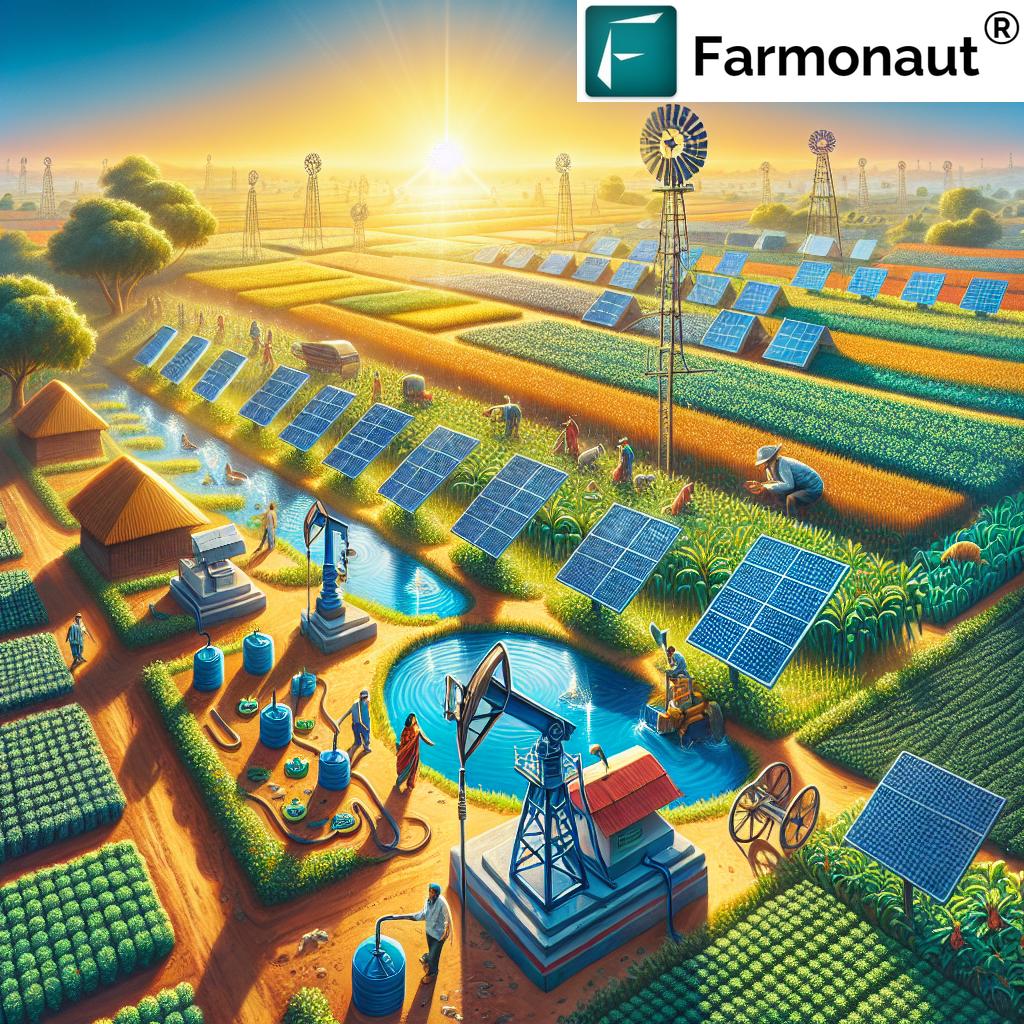Table of Contents
- Introduction: Agritech Bangalore in 2025
- The Evolving Agritech Landscape in Bangalore
- Precision Farming and IoT: Core Drivers of the Revolution
- Bangalore Farmers Market: The Digital Marketplace Experience
- Aquaculture and Fish Farming in Bangalore: A Booming Sector
- Comparison Table: Key Agritech Innovations in Bangalore – Agriculture vs Fish Farming
- Farmonaut: Satellite Technology for Bangalore’s Agritech Advancement
- Sustainability, Resource Management, and Environmental Impact
- Government Initiatives and Policy Support in Karnataka 2025
- Future Trends: Bangalore’s Agritech & Fish Farming Outlook for 2025 and Beyond
- FAQ: Agritech Bangalore 2025
- Conclusion: Agritech Bangalore – The Path Forward
“Bangalore’s agritech sector is projected to grow by 27% in 2025, revolutionizing local agriculture and fish farming markets.”
Agritech Bangalore: Agriculture & Fish Farming Market
Summary: Bangalore’s Agritech Revolution: Transforming Agriculture and Fish Farming in 2025
Bangalore, long celebrated as India’s technology hub, is now surging ahead as an emerging beacon of agricultural innovation. In 2025, the fusion of agritech with agriculture in Bangalore and rapidly advancing fish farming in Bangalore is reshaping the city’s markets, empowering farmers and consumers alike. By leveraging advanced technology and sustainable practices, Bangalore’s agritech ecosystem is transforming farming from traditional methods to data-driven, sustainable, and highly productive systems.
This blog explores how agritech Bangalore is fostering growth, efficiency, and sustainability—delving into digital platforms, IoT sensors, AI-based monitoring, and groundbreaking solutions for both crop agriculture and aquaculture. We’ll also examine the Bangalore farmers market phenomenon and how platforms like Farmonaut are democratizing access to satellite-driven innovation across Karnataka and beyond.
The Evolving Agritech Bangalore Landscape in 2025
Bangalore’s location as India’s Silicon Valley places it at the epicenter of technology-driven change in the agricultural sector. Across the city and its surrounding regions, agritech startups and research institutions are pioneering the deployment of precision farming techniques, IoT-enabled sensors, AI-driven crop analytics, and data-driven tools—all tailored to optimize efficiency, yield, and sustainability in both crop and fish farming.
- Rapid Expansion: The agritech sector in Bangalore has seen an unprecedented growth rate—with over 150 startups and continuous investment from private and government stakeholders.
- Urban-Periurban Nexus: As urban sprawl expands, pressure on arable land and water sources has intensified, making smart resource management and innovative practices essential, particularly in peri-urban areas.
- Sustainable Practices: Environmental concerns and climate change are catalyzing a shift towards sustainable agriculture, regenerative practices, and integrated aquaculture systems in 2025.
The synergy between urban technology prowess and rural agricultural needs positions Bangalore as a pioneering hub for agritech and fish farming innovation.
Precision Farming, IoT, and AI: Core Drivers of the Agritech Revolution in Bangalore
The marks of change in agriculture in Bangalore are unmistakable in 2025. The agritech revolution is grounded in a combination of advanced technologies reshaping how farmers interact with soil, water, crop, and even livestock.
Why Precision Farming Matters
- Optimized Inputs: Sensors and drone imaging track soil health, moisture, and nutrient levels, ensuring optimal input use and reduced wastage.
- Yield Increase: Data-driven insights enable farmers to optimize crop cycles, combat erratic weather patterns, and achieve higher yields with less risk.
- Cost Reduction: AI-powered management tools help automate irrigation, fertilization, and pest/disease management for efficient and sustainable farming.
Key Innovations in Agritech Bangalore’s Farming Ecosystem
- IoT Sensors & Smart Devices: Real-time monitoring of soil health, temperature, and water quality allows for informed, proactive action.
- Satellite Imaging & Remote Sensing: High-resolution images from platforms like Farmonaut revolutionize crop monitoring, enabling rapid detection of crop stress and soil depletion.
- AI and Predictive Analytics: Machine learning models anticipate weather shifts and disease outbreaks, minimizing crop losses and supporting better planning.
- Blockchain Traceability: Platforms offering blockchain-backed traceability (see Farmonaut Product Traceability) enhance trust and transparency from farm to table—crucial for today’s health-conscious consumers.
Smart Weather Forecasts & Digital Tools
Farmers gain access to real-time forecasts and digital advisory systems that help them decide when to irrigate, fertilize, or harvest crops. IoT-linked weather stations deliver hyper-local weather updates, vital for areas prone to erratic weather patterns or water scarcity.
This tech-led transformation is not a mere buzzword: it’s a tangible force driving change in farming practices, empowering both large-scale agribusinesses and smallholder farmers to thrive in 2025’s competitive market.
Resource Management and Carbon Footprinting Tools
- Advanced resource management solutions offered by satellite platforms, such as Farmonaut’s Carbon Footprinting, enable agricultural stakeholders to track carbon emissions, optimize field inputs, and adopt sustainable practices that align with new policies and conscious consumer trends.
- Environmental impact monitoring tools nudge Bangalore’s agriculture sector toward global best practices by providing real-time insights and data-backed recommendations for field operations and resource stewardship.
“Over 150 agritech startups in Bangalore are deploying AI-based solutions to boost fish farming efficiency in 2025.”
Farmers Market Bangalore: Digital Platforms Connecting Farmers & Consumers
The Bangalore farmers market—once a conventional marketplace—stands transformed in 2025 into a sophisticated, tech-aided network of digital marketplaces. Here, fresh organic produce is exchanged transparently, connecting farmers directly with urban consumers and minimizing intermediaries.
How Agritech is Reshaping Local Markets
- Digital Platforms: Cutting-edge apps and web platforms allow farmers to list their products, set fair pricing, and communicate with consumers in real time.
- Supply Chain Optimization: AI-based analytics predict demand, optimize delivery routes, and enable cold storage scheduling—ensuring freshness and quality.
- Building Trust: Blockchain-backed traceability assures consumers that food is organic, safe, and sourced locally, while boosting farmer income by reducing wastage and commission losses.
Transparency and Connectivity at the Core
Digital platforms supporting farmers market Bangalore have enabled a new era of hyperlocal, sustainable trade, exemplifying the rise of urban-rural synergy. Marketplace apps not only empower farmers with better access to end consumers but also stimulate the growth of artisanal agricultural products—including heirloom grains, specialty fruits, and innovative aquaculture-based foods.
The integration of modern technology into Bangalore’s farmers markets boosts efficiency, shortens supply chains, and provides real-time marketplace analytics for demand and pricing trends—all addressing perennial challenges for local farmers and urban areas.
For technology-aided large-scale farm and market management, digital tools like Farmonaut’s Large Scale Farm Management Solution offer dashboard-based controls for data-driven farming, collaborative workflows, monitoring field operations, and seamless multi-user management.
Artisanal Produce and Value-Addition
Banglore farmers markets epitomize transformation, with fresh, organic products exchanged transparently in an environment that fosters trust, food security, and community engagement. These markets are also hubs for sustainable packaging, traceable food chains, and innovative supply chain models, setting new standards for urban agriculture market systems.
Fish Farming in Bangalore: Harnessing Agritech & Aquaculture Innovation
A rapidly expanding segment within agriculture in Bangalore is fish farming, leveraging the city’s natural proximity to lakes and water bodies, as well as its access to urban markets. In 2025, fish farming in Bangalore has become a lucrative and sustainable avenue for income generation, with technology as its backbone.
Key Technological Advances in Fish Farming in Bangalore
- Automated Aquaculture Systems: IoT-linked feeders, water pumps, and aerators automate daily tasks and optimize water quality for fish growth.
- Water Quality Monitoring: Sensors detect dissolved oxygen, temperature, and pH—enabling real-time correction and saving valuable resources.
- AI & Data-Driven Disease Control: Predictive analytics trigger biosecurity measures against disease outbreaks, protecting both yield and environment.
- Sustainable Feed Management: Rationed, balanced feeds reduce environmental impact and boost fish productivity.
These integrated technologies reduce manual effort, dramatically increase productivity, and promote long-term environmental and economic sustainability for large and small operators alike. By 2025, over 150 agritech startups in Bangalore have introduced AI-powered systems for efficient, scalable fish farming.
Integrated Farming Systems
- Many farmers are embracing integrated farming, where aquaculture is combined with crop production. This approach diversifies income streams, recycles nutrients, and enhances food security—offering a sustainable response to climate and market challenges.
Comparison Table of Key Agritech Innovations in Bangalore: Agriculture vs Fish Farming (2025 Estimate)
| Category | Technology Applied | Agriculture Impact (2025 Estimate) | Fish Farming Impact (2025 Estimate) | Sustainability Benefit |
|---|---|---|---|---|
| Precision Farming | IoT Sensors, Satellite Imaging, Drones | 15-25% yield increase, 20% input cost reduction | Automated feeders, 10-15% FCR improvement | Reduced water/fertilizer use, less chemical runoff |
| Water Management | Smart Irrigation, Automated Aeration | 25-35% irrigation water savings | 30% reduction in pond water usage | Water conservation, energy savings |
| AI-based Monitoring | AI Crop & Disease Prediction | Losses reduced by 20%, early disease alerts | Disease outbreak cuts reduced by 30% | Minimized chemical use, improved biosecurity |
| Supply Chain & Marketplace | Digital Marketplaces, Blockchain Traceability | 5-10% improved pricing, 15% lower post-harvest loss | 20% shorter supply chain, more direct consumer links | Reduced wastage, improved transparency |
| Carbon & Environmental Tracking | Remote Sensing, Carbon Analytics Dashboards | 10% lower carbon footprint, better compliance | 15% GHG emission reduction in aquaculture | Ecosystem health, climate resilience |
| Fleet & Resource Management | Logistics Management Software, Satellite Tracking | Operational cost cut by 12-18% | Transport efficiency gain by 10% | Lower fuel use, reduced emissions |
Farmonaut: Satellite Technology for Agritech Bangalore’s Growth
As Bangalore cements its status as a pioneering agritech hub, access to real-time, affordable, and scalable technology becomes paramount. We at Farmonaut are helping shape this future by providing satellite-based solutions for farming, resource management, and environmental monitoring, all accessible through apps and APIs.
-
Satellite Monitoring: Our Web, Android, iOS, and browser apps empower users with NDVI, soil health, and crop/vigor maps—driving better decision-making in fields across Karnataka and beyond.



-
API Access: Developers, startups, and agritech platforms in Bangalore can integrate satellite and weather insights through our
Farmonaut Satellite API
and
Developer Documentation, supporting ecosystem-wide solutions for monitoring, advisory, and compliance. -
Product Traceability: For Bangalore’s markets and fish farming industry,
Farmonaut Traceability
ensures blockchain-backed transparency across the supply chain. -
Carbon Footprinting: In response to the rising demand for climate-smart agriculture,
our Carbon Footprinting solution
helps Bengaluru’s agricultural and aquaculture sectors track and reduce emissions. -
Fleet Management: Efficient logistics and input delivery are supported through
Farmonaut Fleet Management,
optimizing machinery, transport, and boosting farm efficiency. -
Crop Loan & Insurance: Our
Crop Loan & Insurance Verification
platform leverages satellite verification for secure, expedited financing for farmers.
Our mission is to democratize satellite-driven insights—making them affordable and accessible to Bangalore’s farmers, businesses, startups, and local governments. By blending satellite imagery, AI, and blockchain on a mobile-friendly platform, we help the agritech ecosystem deliver true technology-led growth in 2025.
Farmonaut Subscriptions for Agritech, Monitoring, and Analytics
Sustainability, Resource Management, and Environmental Impact
Bangalore’s transformation as an agritech hub hinges upon balancing sustainability with productivity. The integration of advanced resource management systems ensures that soil health is preserved, water use is minimized, and carbon output is tracked for compliance and environmental stewardship.
Meeting Climate and Resource Challenges
- Soil & Water Conservation: Precision irrigation and real-time soil analytics reduce overuse and degradation of resources.
- Carbon Neutrality: Bangalore’s farms and aquaculture units are racing towards climate-resilient operations, aided by digital carbon footprint monitoring.
- Integrated Systems: The widespread adoption of aquaponic and integrated aquaculture-agriculture systems recycles nutrients, conserves water, and enhances biodiversity.
The city’s agritech sector is not only addressing immediate economic and food security needs, but also laying the groundwork for sustainable, climate-ready models of farming that can be scaled across Karnataka.
Policy Framework: Fostering Agritech, Fish Farming, and Digital Inclusion in Bangalore
The government of Karnataka and local stakeholders are playing an active role in fostering the agritech revolution in Bangalore and surrounding areas through a mix of policy instruments, incubation centers, digital literacy drives, and investment programs.
- Funding and Incubation: Startup hubs and incubators provide technical mentoring and financial support to agritech ventures innovating in monitoring systems, fish farming, logistics, and sustainable practices.
- Policy Support: Initiatives promoting digital inclusion equip farmers with smartphones, training, and subsidies for technology adoption, thus bridging the rural-urban knowledge gap.
- Compliance Frameworks: Regulations are nudging transition to sustainable food systems with targets for resource efficiency, traceability, and eco-certification.
Strategic public-private investment is ensuring that cutting-edge technologies remain within reach for the average farmer and emerging aquaculture entrepreneurs in Bangalore.
Future Trends: Bangalore Agritech & Fish Farming Outlook Through 2025 and Beyond
Looking ahead, Bangalore’s agritech ecosystem is expected to play a critical role in regional food security, climate resilience, and rural empowerment. The coming years will see further integration between urban technologies and traditional best practices, with new frontiers emerging in:
- Regenerative Agriculture: Shifts towards environmentally restorative practices—cover cropping, no-till farming, and carbon-positive models.
- Precision Aquaculture: More farms leveraging AI, IoT, and blockchain for yield optimization, traceability, and waste minimization.
- Decentralized Marketplaces: Marketplaces connecting farmers directly to households through P2P models and smart contracts.
- Smart Financing: Widespread use of satellite-verified loans and AI-powered crop insurance to derisk smallholder agriculture.
- End-to-End Traceability: Adoption of blockchain across Bangalore’s agri and aqua supply chains for transparency and fraud reduction.
The ongoing collaboration between technology innovators, sustainable producers, and market-driven consumers ensures that the agritech revolution in Bangalore will not only continue—it will become a blueprint for rapid modernization of agriculture across India.
FAQ: Agritech Bangalore 2025
- What is the main driver of agritech growth in Bangalore for 2025?
The primary growth drivers are technology innovation (AI, IoT, satellite monitoring), digital literacy, government support, and vibrant startup participation. - How are Bangalore farmers markets changing in 2025?
They now function as digital, transparent platforms that connect farmers directly to urban consumers, streamline supply chains, and offer blockchain traceability. - Is fish farming in Bangalore viable for smallholders?
Absolutely—IoT sensors, automated feeders, and digital management make fish farming profitable and sustainable even for small-scale operations. - How does satellite technology help farmers in Bangalore?
Satellite platforms provide real-time monitoring, AI-based advisory, yield prediction, and environmental impact tracking—crucial for Bangalore’s resource-challenged landscapes. - What sustainability solutions are most impactful in Bangalore’s agritech ecosystem?
Precision irrigation, automated disease management, carbon footprint tracking, and blockchain-enabled traceability collectively drive sustainable growth. - How can technology reduce waste in agriculture and aquaculture?
Real-time data predicts market demand, streamlines logistics, and ensures only required production—drastically reducing food and water wastage. - What digital tools are available for Bangalore’s agritech community?
Satellite imagery and analytics apps, weather forecast platforms, blockchain traceability, and smart fleet management.
Conclusion: Agritech Bangalore – Pioneering the Future of Sustainable Agriculture & Fish Farming
In 2025, Bangalore emerges not just as a tech city, but as a pioneering agricultural hub where centuries-old farming traditions are intelligently merged with modern agritech innovations. From empowering urban farmers markets to revolutionizing fish farming systems, the city’s technology-powered approach ensures that productivity and sustainability go hand in hand.
The ongoing revolution in agritech Bangalore is an inspiring testament to what’s possible when technology, market forces, and government policy converge. By 2025 and beyond, Bangalore’s fusion of agriculture, aquaculture, and digital platforms is certain to inspire similar transformation across regions seeking to modernize their agricultural markets without compromising environmental integrity.
With accessible platforms, powerful analytics, and community-focused innovation, Bangalore is not only addressing the challenges of yield, climate, and food security—it’s setting a model for sustainable urban-rural synergy throughout India and beyond.









